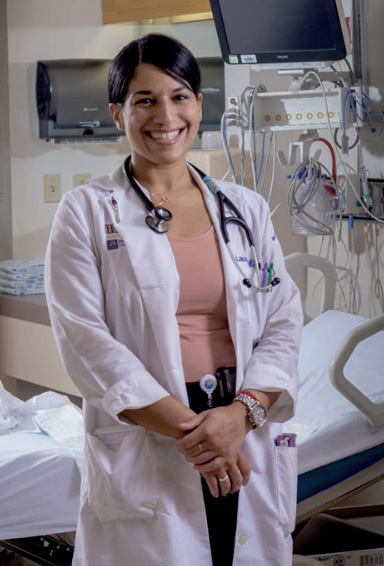Once a month I travel to a safe haven that provides shelter to socioeconomically disadvantaged women and children affected by domestic violence. There, I facilitate what has become known as "Doctor's Night."

Lauren Hunter, MD, is a third-year resident in the Drexel/Hahnemann Internal Medicine Residency program.
The first session focused on heart health. I borrowed a small plastic model of the heart from the coronary care unit at the hospital and brought echocardiograms demonstrating normal and abnormal myocardial contraction. I prepared a few key teaching points, but encouraged participants to guide the session. As expected, women asked questions about common medical problems such as strokes, hypertension, and diabetes. The session took a more personal turn as women shared stories of loved ones, explained beliefs supporting complementary therapies, and expressed doubts about the appropriateness of their prescribed medications.
In subsequent sessions, my lesson plan continued to take a backseat to issues surrounding individual experiences with the medical establishment — shifting the purpose from agenda-focused health literacy to understanding the needs and voice of the community I was serving.
My decision to become a doctor came later in life than for most of my colleagues. The idea first occurred to me after college when I was on Medicaid. It was triggered by a deep awareness of health disparities shaped by long wait times in free clinics and inferior medical care. I remember thinking, "there need to be more doctors here," and I considered the possibility of becoming one. I had no background in science, but the seed to practice medicine as a means for social justice had been planted and I embraced the transformation as it took root.
I often equate the experience of introductory medical training to learning how to be a robot. For me, mastery of the necessary facts, systems, and algorithms required a great deal of thinking "inside the box." I found the true art of medicine to be revealed while working with patients. Prior to beginning residency, I became familiar with the teachings of an Indian mystic. In one of his lectures, he urges medical students to make a serious effort to turn inward and know themselves before touching the bodies of their patients. This concept resonated with me personally and professionally. In devoting some time to meditation, I learned how to create distance from robotic and limited medical thinking by staying involved in activities honoring the roots of my desire to become a physician.
Early in my second year of residency, the Department of Medicine's cardiology interest group wanted to implement an arm for community outreach. I saw the role of community outreach coordinator as a perfect opportunity to nurture these roots. Researching volunteer projects led me to Dr. Ana Núñez, associate dean for diversity, equity and inclusion for Drexel College of Medicine. She put me in touch with an administrator for two safe havens, and we scheduled the session on heart health.
I find the more I prepare for each session, the more it moves in a different direction. I enjoy expanding on clients' specific suggestions for topics, but there are new faces every month, as many relocate to more permanent housing. Last month I prepared a requested workshop on herbs and supplements for women's health. When I showed up, the meeting room was filled with 10 children ages 6 months to 10 years, and a different group of women, not interested in hearing about herbs. In an effort to engage both clients and their children, we instead spent time learning how to make a Tibetan medicine bowl sing and thinking about whether or not the vibratory sound was "medicine."
The exact health benefits of a session like this, or any session for that matter, are unclear, and I have no intention of empirically studying the outcomes. It is my belief that this is the kind of passion project where simply showing up leads to the greatest impact for all participants, including myself.
— Lauren Hunter, MD